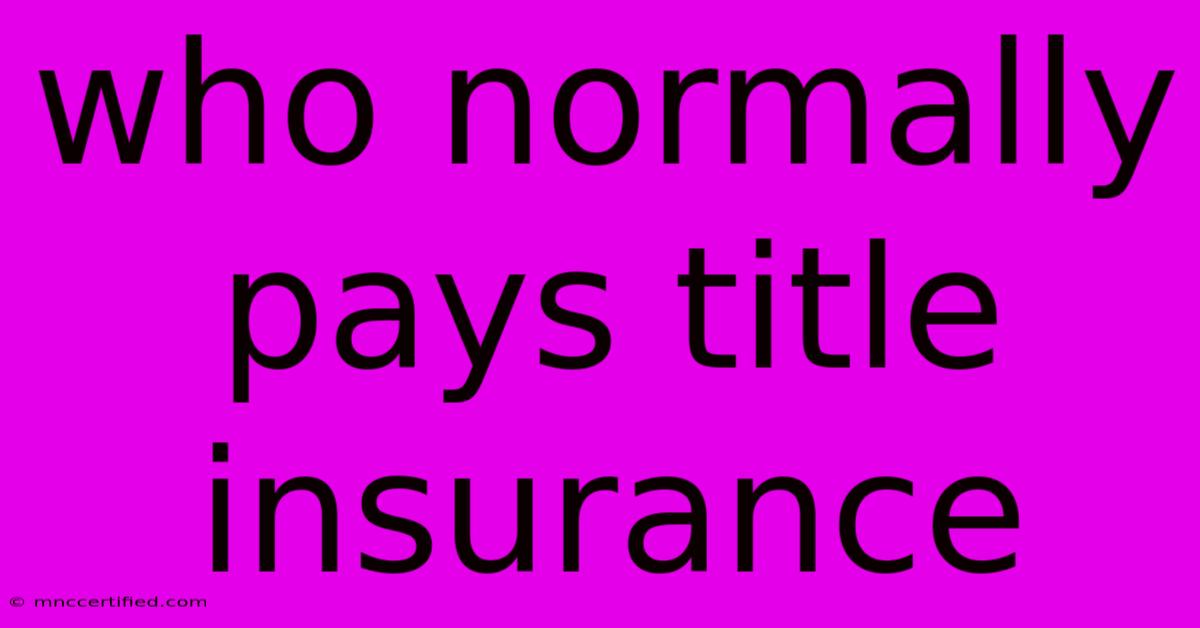Who Normally Pays Title Insurance

Table of Contents
Who Normally Pays for Title Insurance? A Comprehensive Guide
Buying a home is a significant financial undertaking, and understanding the costs involved is crucial. One often-overlooked expense is title insurance. But who actually foots the bill for this vital protection? This comprehensive guide breaks down who typically pays for title insurance and why it's a worthwhile investment.
Understanding Title Insurance: Protection Against Hidden Risks
Before diving into who pays, let's clarify what title insurance does. It protects homeowners and lenders against financial losses stemming from defects in a property's title. These defects could include:
- Forged documents: Someone fraudulently claiming ownership.
- Unpaid liens or taxes: Outstanding debts attached to the property.
- Encroachments: Structures built on neighboring property.
- Errors in public records: Mistakes in official land records.
Title insurance provides peace of mind, shielding you from potentially devastating financial consequences if these hidden title issues arise after you've purchased the home. There are two main types:
- Lender's Title Insurance: Protects the lender against title defects.
- Owner's Title Insurance: Protects the homeowner against title defects.
Who Pays for Lender's Title Insurance?
Generally, the buyer pays for the lender's title insurance. This is often a condition of the mortgage loan. The lender requires this protection to safeguard their investment. They want to ensure the property they're financing is actually owned by the seller and free from significant title problems. While the buyer pays upfront, it's important to understand that this protects the lender, not necessarily the buyer to the same extent.
Who Pays for Owner's Title Insurance?
The payment of owner's title insurance varies by location and negotiation. In most cases, the buyer pays for the owner's title insurance policy. This protects the buyer's investment for as long as they own the property. This is a one-time premium, providing lifelong protection against covered title defects.
However, there are exceptions:
- Negotiated costs: In some real estate markets, or in particularly competitive situations, the seller might agree to cover the cost of owner's title insurance as a negotiating tactic to make their offer more attractive. This is less common, but not unheard of, particularly in buyer's markets.
- Customary practices: Local customs can influence who pays. Certain regions might have established norms regarding who covers the owner's policy.
- Contractual agreements: The purchase agreement explicitly states who is responsible for paying the title insurance premiums.
Why It's Important to Understand Who Pays
Understanding who pays for each type of title insurance is crucial for several reasons:
- Budgeting: Knowing the costs upfront helps you accurately budget for closing costs.
- Negotiations: It can be a point of negotiation in a real estate transaction.
- Protection: Ensuring you have the appropriate coverage protects your significant investment.
Conclusion: A Vital Part of the Homebuying Process
While the buyer typically pays for both lender's and owner's title insurance, negotiations can influence who covers the owner's policy. Always clarify this during the home-buying process and discuss it with your real estate agent and closing attorney to ensure you have the necessary protection and understand the associated costs. The seemingly small cost of title insurance provides a significant layer of protection for your most valuable asset. Remember to ask questions and seek clarity—your peace of mind is worth it.

Thank you for visiting our website wich cover about Who Normally Pays Title Insurance. We hope the information provided has been useful to you. Feel free to contact us if you have any questions or need further assistance. See you next time and dont miss to bookmark.
Featured Posts
-
So Cal Thanksgiving Travel Record High Expected
Nov 19, 2024
-
Paul Teal 35 One Tree Hill Actor Passes Away
Nov 19, 2024
-
Functional Medicine And Insurance
Nov 19, 2024
-
Bo Nixs Broncos Career Early Assessment
Nov 19, 2024
-
Dennis Gutman Insurance Manitowoc
Nov 19, 2024